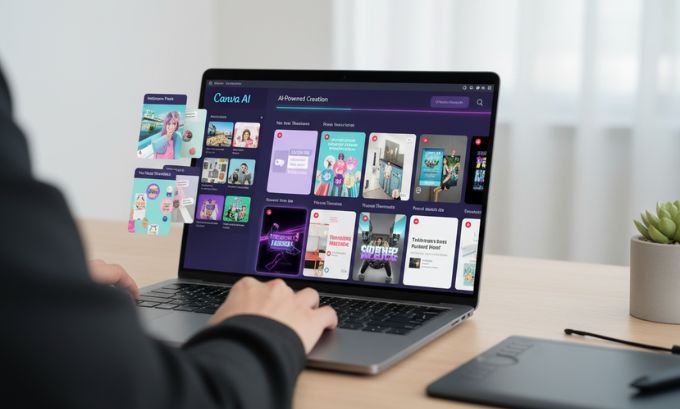Artificial Intelligence is revolutionizing social media by automating tasks, delivering deep insights, and personalizing user experiences. The role of AI in social media marketing is to enhance efficiency, elevate content strategy, and provide a clear competitive advantage. Brands that integrate AI can create more impactful campaigns, understand their audience on a deeper level, and achieve a higher return on investment.
This article explores how AI is reshaping the landscape of social media. We will cover everything from content generation and analytics to customer service and competitor analysis. You will discover practical applications, see real-world examples, and get a clear understanding of the tools driving this transformation.
Table of Contents
How AI is Transforming Social Media Marketing
The core function of Artificial Intelligence (AI) in social media marketing is to process vast amounts of data at a speed and scale that humans cannot. It automates repetitive tasks, identifies patterns, and provides predictive insights that empower marketers to make smarter, data-driven decisions. Instead of spending hours on manual work, social media managers can focus on strategy, creativity, and building genuine community connections.
AI’s impact is felt across every aspect of social media management. It helps generate creative post ideas, write compelling copy, design eye-catching visuals, and schedule content for optimal reach. Beyond creation, AI-powered social media analytics offer a granular view of campaign performance, while social listening tools monitor brand sentiment and track conversations in real time. This allows for proactive engagement and swift crisis management.
My Experience: From Manual Grind to AI-Powered Strategy

As a marketing consultant with over a decade of experience, I remember the days when social media management was a manual grind. We spent countless hours brainstorming content, manually scheduling posts for different time zones, and painstakingly pulling data into spreadsheets for monthly reports. The process was time-consuming and often based on guesswork.
The introduction of AI tools changed everything. I first started using Hootsuite for its advanced scheduling features, but its AI-driven “best time to post” recommendations were a game-changer. Our engagement rates on key posts increased by over 30% within the first month just by following these data-backed suggestions.
Next, we integrated ChatGPT into our workflow for content ideation and copywriting. A task that once took our team a full day of brainstorming could now be accomplished in under an hour. We could generate dozens of caption variations, blog post outlines, and video scripts tailored to different audience segments. This freed up our creative team to focus on producing higher-quality, more ambitious content. For visuals, Canva AI allowed our non-designer team members to create professional-looking graphics and videos, ensuring brand consistency without relying on a dedicated design team for every small task. The efficiency gains were enormous.
Today, our strategy is built on a foundation of AI. We use social listening tools from platforms like Emplifi to understand consumer sentiment around our clients’ brands and their competitors. This allows us to spot emerging trends and adjust our messaging on the fly. This shift from reactive to proactive marketing is perhaps the most significant benefit we’ve experienced.
What I Like / Strengths of AI in Social Media
- Unmatched Efficiency: AI automates repetitive tasks like content scheduling, basic reporting, and caption generation, saving teams dozens of hours each week.
- Data-Driven Decision-Making: AI replaces guesswork with actionable insights, from identifying the best times to post to predicting which content formats will perform best.
- Scalable Personalization: AI tools can analyze audience data to help marketers deliver personalized content and ad experiences at scale, which is impossible to do manually.
- Enhanced Creativity: By handling the grunt work, AI frees up marketers to focus on high-level strategy, creative campaign concepts, and building authentic audience relationships.
- Proactive Insights: AI-powered social listening and competitor analysis allow brands to anticipate market shifts, manage their reputation, and uncover new opportunities before their rivals.
Areas for Improvement
- Lack of Nuance: AI can sometimes miss the cultural context, sarcasm, or subtle emotional cues in human conversation, leading to generic or inappropriate responses.
- Over-reliance Risk: Relying too heavily on AI can stifle originality and lead to a brand voice that feels robotic and detached from its audience. Human oversight is essential.
- Data Privacy Concerns: The use of AI in marketing raises valid concerns about how user data is collected, stored, and used. Brands must prioritize transparency and ethical data handling.
- Potential for Bias: AI models are trained on existing data, and if that data contains biases, the AI’s output can perpetuate and even amplify them.
Key Applications of AI in Social Media Marketing
AI is not a single tool but a collection of technologies that can be applied in various ways to solve specific marketing challenges. From crafting the perfect post to understanding your market position, AI provides powerful solutions.
AI as a Content Creation Engine
AI has become an indispensable assistant for content creation. It helps marketers overcome creative blocks and produce a high volume of quality content efficiently.
Text and Copy Generation
Tools like ChatGPT and Jasper AI have revolutionized copywriting. These generative AI models can produce a wide range of written content, including:
- Social Media Captions: Generate engaging, platform-specific captions in seconds.
- Blog Post Outlines and Drafts: Quickly create structured outlines or even full drafts for long-form content.
- Ad Copy Variations: A/B test different headlines and calls to action to optimize ad performance.
- Video Scripts: Develop scripts for short-form videos like TikToks and Reels.
For example, a social media manager can prompt Jasper AI with: “Write five engaging Instagram captions for a post about our new eco-friendly water bottle. Use a fun and upbeat tone, include a question to boost comments, and add relevant hashtags.” The AI will deliver multiple options, saving significant time and creative energy.
Visual Content Creation

Visuals are critical for capturing attention on crowded social feeds. Canva AI empowers users to create stunning visuals without needing graphic design skills. Its Magic Design feature can generate templates based on a simple text prompt, while its Magic Write tool helps craft text for designs. Other AI image generators can create completely unique images from scratch, providing an endless supply of creative assets for campaigns.
AI for Advanced Social Media Analytics
Data without insight is just noise. AI-powered social media analytics tools turn raw performance data into a clear, actionable strategy. They go beyond simple metrics like likes and shares to provide a deep understanding of what drives results.
These tools can:
- Identify Top-Performing Content: Automatically surface the posts, formats, and topics that resonate most with your audience.
- Provide Audience Insights: Analyze demographic and psychographic data to build detailed audience personas.
- Track ROI: Connect social media activities to tangible business outcomes, such as website traffic, leads, and sales.
- Benchmark Performance: Compare your performance against competitors to identify strengths and weaknesses.
Platforms like Hootsuite and Emplifi integrate these analytics into a unified dashboard, allowing marketers to monitor cross-channel performance in real time. For instance, the analytics might reveal that video content on Instagram generates 50% more engagement than static images, prompting a shift in content strategy.
AI-Powered Social Listening and Competitor Analysis

Understanding the conversation around your brand and industry is crucial. AI-driven social listening tools monitor millions of online conversations to provide real-time insights.
Monitoring Brand Sentiment
These tools use natural language processing (NLP) to analyze mentions and determine whether the sentiment is positive, negative, or neutral. A sudden spike in negative sentiment can alert a brand to a potential PR crisis, allowing them to respond quickly. Emplifi offers sophisticated sentiment analysis that can help brands quantify their brand health and track it over time.
Conducting Competitor Analysis
AI makes competitor analysis more efficient and comprehensive. Instead of manually checking competitor profiles, AI tools can automatically track their activity, including:
- Content Strategy: What topics are they posting about? Which formats are working best for them?
- Engagement Metrics: How does their engagement compare to yours?
- Ad Campaigns: What ads are they running and on which platforms?
- Audience Growth: How quickly are they growing their following?
This information helps you spot gaps in the market, learn from their successes and failures, and refine your own strategy to gain a competitive edge.
AI Comparison: Top Tools for Social Media Marketing
| Tool | Primary Function | Best For | Key AI Feature |
|---|---|---|---|
| ChatGPT | Content Generation | Brainstorming, copywriting, scriptwriting | Versatile natural language processing for generating human-like text. |
| Canva AI | Visual Design | Creating social media graphics and videos | Magic Design generates visuals from text prompts. |
| Jasper AI | Advanced Copywriting | SEO-optimized content, brand voice alignment | Writes persuasive, keyword-rich copy across 50+ templates. |
| Hootsuite | Social Media Management | Scheduling, analytics, team collaboration | Recommends optimal posting times based on audience activity. |
| Emplifi | Unified Marketing Platform | Enterprise-level social listening and customer care | AI-powered sentiment analysis and real-time trend monitoring. |
The Future Role of AI in Social Media Marketing
The integration of Artificial Intelligence into social media marketing is still in its early stages. The future promises even more sophisticated applications that will further automate processes and deliver hyper-personalized experiences.
Predictive analytics will become standard, with AI models forecasting campaign outcomes with high accuracy before a single dollar is spent. AI will also play a larger role in managing online communities, with AI-powered moderators helping to filter spam and foster positive interactions. The evolution of generative AI will lead to the creation of dynamic, interactive content that adapts to each user’s behavior in real time.
However, the human element will remain irreplaceable. Creativity, empathy, strategic thinking, and the ability to build authentic relationships will become even more valuable skills for social media professionals. The future is a collaboration between human ingenuity and AI efficiency.
As AI-driven tools reshape digital marketing, even e-commerce businesses like TokyoMart.store are leveraging smart automation to streamline customer engagement and product discovery. AI-enhanced backlink tracking platforms, such as LinkLuminous.com, help marketers monitor SEO performance and optimize link-building strategies across social channels.
Frequently Asked Questions (FAQ)
1. Will AI replace social media managers?
No, AI will not replace social media managers. Instead, it will augment their roles by automating repetitive tasks, allowing them to focus on higher-value activities like strategy, creative direction, and community building. The human touch remains essential for understanding cultural nuance and building authentic connections.
2. What is the most important role of AI in social media marketing?
The most important role of AI is to turn massive amounts of data into actionable insights. This enables marketers to make data-driven decisions, personalize content at scale, and measure the direct impact of their efforts on business goals, moving beyond simple vanity metrics.
3. How can a small business start using AI for social media?
A small business can start by using accessible tools like Canva AI for creating visuals and the free version of ChatGPT for brainstorming content ideas and writing captions. They can also use the built-in analytics on social platforms and experiment with the AI-powered scheduling features in affordable tools.
4. What are the main risks of using AI in social media marketing?
The main risks include a loss of brand authenticity if the content becomes too robotic, the potential for AI to perpetuate biases found in its training data, and data privacy concerns over how user information is handled. A strong human oversight and ethical framework are crucial to mitigate these risks.
5. How do AI social listening tools work?
AI social listening tools work by continuously scanning social media platforms, blogs, forums, and news sites for specific keywords or brand mentions. They use Natural Language Processing (NLP) to analyze the text and determine the context and sentiment (positive, negative, neutral), providing brands with real-time feedback on their reputation and market trends.
6. Can AI help with influencer marketing?
Yes, AI can significantly help with influencer marketing. AI-powered platforms can identify potential influencers based on audience demographics, engagement rates, and content relevance. They can also help track campaign performance and measure the ROI of influencer collaborations more accurately.
7. Is Jasper AI better than ChatGPT for social media?
Jasper AI and ChatGPT are both excellent tools, but they serve slightly different purposes. ChatGPT is a versatile conversational AI great for brainstorming and general-purpose writing. Jasper AI is more specialized for marketing copy, offering templates and features specifically designed to create persuasive, brand-aligned, and SEO-optimized content for social media and blogs.
Conclusion
The role of AI in social media marketing is no longer a futuristic concept—it is a present-day reality that is fundamentally changing how brands connect with their audiences. From automating content creation with tools like Jasper AI and Canva AI to providing deep strategic insights through social media analytics and competitor analysis, AI empowers marketers to work smarter, not harder. Platforms like Hootsuite and Emplifi are leading the charge by integrating these technologies into comprehensive management solutions.
By embracing AI, you can streamline your workflow, make more informed decisions, and ultimately drive better results. The key is to view AI not as a replacement for human creativity but as a powerful partner that enhances it. Start by identifying the most time-consuming parts of your social media process and explore how AI can help you reclaim that time for what truly matters: building a brand that people love.
About the Author
Alex Chen is a seasoned digital marketing strategist with over 12 years of experience helping brands navigate the complexities of the online world. Specializing in social media strategy and content marketing, Alex has worked with both Fortune 500 companies and agile startups to build engaged communities and drive measurable growth. His insights have been featured in leading marketing publications, and he is a passionate advocate for leveraging technology to create more human-centric marketing.


